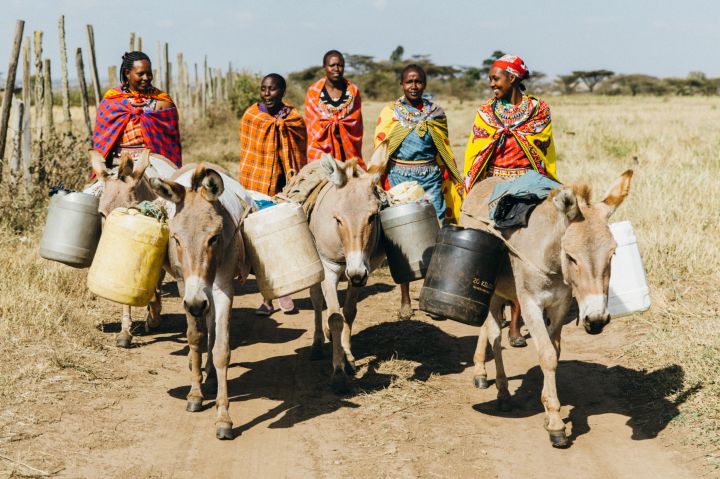

By Sebastian Mwanza & Dr. Dennis Bahati
The final orange-hued rays had appeared on the skyline, which went through the clouds and the prodigious sky was easily visible. And now, the hot bowl had gently come out of its abode across the brilliant orange horizon and glimmered in the sky, just above the tangerine Kenya-Tanzania border hills.
The time is 9:27 AM. A silhouette feeble figure, walking with a cane and draped in green Maasai regalia warily crosses the international beacon-marked border, from Tanzania to Kenya, at the Olposumoru border Point in Narok County, Kenya, headed for a donkey forum at the Chief’s camp just a stone throw away. He looks as though a puff of wind could blow him down.
When he was within sight, the old man’s deep wrinkles seemed to carve a map of his life on his still agile and mobile facial features. With each movement, there was the creak of old bones, hand tremor, and constant waggling and bobbing of the head. Mzee (loosely translated to mean ‘male elder’) Ezekiel Morintat, as we would later learn of his name, had a fringe of grey-white hair around his balding, mottled scalp and a back slightly hunched.
After joining the meeting and exchanging normal pleasantries with fellow donkey owners, he quietly latched his seemingly tired body frame on a stone’s slab facing the direction to which he had come.

Fifteen minutes later, Julius Lekoole, the Olposumoru area chief called the meeting to order. With the help of a Maasai translator, he introduces Africa Network for Animal Welfare (ANAW) Staff and their mission to this sleepy and almost forgotten corner of East Africa’s economic powerhouse. When the 27 donkey consultative meeting attendees learn that ANAW staff members are there to discuss the impact of illegal cross-border movement and trade of donkeys and to partner with the community in seeking ways of stopping the prevailing rampant donkey theft, the initial disquiet mood of the meeting suddenly lightens up, and nods multiply.
Eerie silence ensues before the next person shares his or her experience. They painfully absorb and swallow hard as harrowing narratives of donkey loss are shared. Before 2016, when wanton donkey theft visited their village at the border, many of them were keeping an average of 20-70 donkeys per household. Life changed so dramatically when the Kenyan government allowed commercial slaughter and export of donkeys. They all agree that is when their donkeys started missing and could not find them even after reporting the theft cases to the area chief, who jiggled his head in agreement. They learned that their stolen donkeys were being slaughtered in Naivasha’s Star Brilliant Donkey abattoir and wanted ANAW to help them ‘talk’ to the government to close the donkey slaughterhouses so that they may keep their remaining few donkeys.
Towards the end of the meeting, we notice Mzee Morintat who had introduced himself as a Tanzanian once-a-donkey owner, residing not far from the border had not uttered a word. All through the discussions, his expression was of frustration and fatigue. The world seemed no place for him; he had had enough. He seemed to have had stories to tell, experience danced on his lips like a curious child. And yet he stayed silent, those listless eyes just watching, not telling. His not-so-good memories haunted him, sometimes drawing a tear.
The chief gestured to him to share his story. After clearing his throat, the wizened old man described his life, and we were instantly transported to another place and time. His voice was slow, and he stumbled on his words at times. Sometimes, he was overtaken by emotions that had been buried for years and he would have to pause.

“The manyatta where our seven families have stayed for more than four decades had 600 donkeys before 2016. Now we have only eight remaining. We have sold none; all of them stolen at night, and we have not recovered any.” Mzee pauses and continues after whisking a fly away from his weary eyes. “My family has no donkey currently, and yet we had 48 donkeys before 2016. The first batch of 29 donkeys were stolen in March 2017 and the remaining taken away by December of the same year.” He looks down, with his left gnarled hand supporting his stubbled chin and leaning on his walking cane, by his right hand.
His eyes were so heavily lidded and weighed down with wrinkled folds that it was almost like talking to someone asleep, yet he was quite alert. He looked up and in unexpected crescendo said, “Those donkeys were our lives. We drank water because of them. We ate because of them. We moved because of them. They were part of our family. We bewail their disappearance. Life has been hard for my family. At times we sleep hungry. Children sometimes miss school. My wives are now the donkeys themselves…”
With those words, Mzee staggeringly rose. His eyes were wet. Amid difficulty, he started out for the border point, from where he had come. After three steps he abruptly stopped and turned around to face the gathering. Looking directly at ANAW staff he firmly said, “If you can, ask Kenyan government to shut the donkey abattoirs. Communities that rely on donkeys for their livelihoods are suffering. People are dying.” He then straightened up and with the cautiousness of a calculating chameleon, he proceeded for home, with that resigned look of one who knows that at his age, life had stopped giving and only took away.
Mzee Morintat represents hundreds of donkey owners especially those living on the borderlines of Kenya and Tanzania who have wallowed in the miasma of pain, sorrow, and abject poverty arising from the illegal cross-border trade of donkeys that has continued since 2016 leaving behind a trail of socio-economic destruction.

From Kenya’s Oloolaimutia, Olposumoru in Narok County to Shompole, Namanga, Olgulului, and Olmapinu in Kajiado County, deep etched pain and resignation register in the eyes of donkey owning communities; their facial furrows occasioned not by age, but of sorrow and poverty are marks of their endurance. In Tanzania’s Longido, Sinya, Tarakea, and Mgagao regions the story is the same for the donkey dependent communities. The situation is so dire that community elders warn there would be no donkey left roaming the expansive border stretch by 2023 if nothing is done to halt the illegal cross-border movement of donkeys.
When the rains started pounding
Since 2016, Kenya has seen the operationalization of four donkey abattoirs—more than any other country on the continent—that has hitherto driven the ‘beast of burden’ to near annihilation. These entities: Star-Brilliant (Nakuru County), Goldox Kenya Limited (Baringo County), Fuhai Machakos Trading Company (Machakos County) and Silzha Limited (Turkana County) have been slaughtering over 1,000 donkeys every day to quench an insatiable demand for donkey skin products by the Chinese and Asian populace, crippling an already dwindling population of 1.8 million as per the Kenya National Population and Housing Census (2009).
Kenya and Tanzania share a scarcely unmanned border stretch of nearly 769 kilometers with only two official border crossing points (Namanga and Kibauni) along Kajiado and Narok Counties that link the two countries to facilitate socio-economic ties.

According to our sources, the donkey cross-border movement was driven by the soaring demand for donkeys in Kenya induced by better prices offered in donkey markets and slaughterhouses. Unscrupulous traders would pay middle-men mostly Maasai traders around KES 5,000 to ‘get’ donkeys from Tanzania and move them across the border through unofficial routes to Kenyan soil from which they would load them inhumanely on waiting trucks and transport them for days without any nourishment, to slaughterhouses or donkey markets, where they would sell them between KES 12,000 – KES 15,000 making exorbitant profits, a claim confirmed by the County Director of Veterinary Services in Kajiado County, Dr. Achola Yala. “An estimate of 108,000 donkeys were trafficked into Kenya from Tanzania between 2017 and 2019 through seven unsanctioned and treacherous routes: Ololaimutia, Ilkerin, and Olposimoru in Narok County as well as Shompole, Namanga,” Dr. Yala added.
The Promise That Never Was!
The promulgation of the Constitution of Kenya in August 2010 promised a fresh epoch for its subjects’ dignity (both human and non-human). One of its key promises was sustainable exploitation, utilization, management, and conservation of the environment and natural resources; while fostering public participation in the management, protection, and conservation of genetic resources and biological diversity. A decade down the course, this realization and conviction is still a transient ambition.

The wanton slaughter of donkeys in Kenya for meat and skin with no regulation or resource allotment towards research and future preservation is contrary to the ideals of Kenya’s 2010 constitution. There exists a massive disparity regarding policy and legal frameworks that are responsible for upholding donkey welfare, public health, and environmental conservation both at national and county levels. In addition, the lack of a national donkey identification, registration, and traceability system has muddled the tracking and recovery of the animal across the vast border.
Glimmer of hope
After a sustained media campaigns against illegal cross-border movement of donkeys by ANAW and Brooke East Africa climaxing on airing of a special investigative piece dubbed #HideousBurden by a regional broadcaster, concerned communities breathed a sigh of relief on February 24, 2020, as Kenya’s Minister for Agriculture and Livestock, Hon. Peter Munya made a landmark pronouncement that the government was banning donkey export trade and subsequently giving the proprietors of the existing four donkey abattoirs a month’s notice to wind up donkey business. Hon. Munya has since published the ban in Kenya’s Gazette Notice to make it a government directive.
However, while this seems to be good news to many, there are fears that this trade is far from over, for it may have just opened the dark door to donkey’s black market. Importantly, with Kenya still reeling under the cancer of corruption, some shrewd businessmen with a keen interest in donkey trade may end up buying their way to have the ban lifted.
















